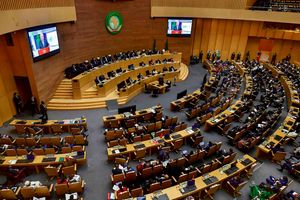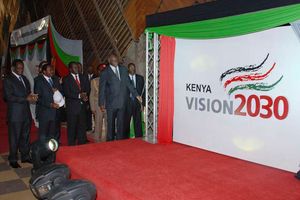
Some of the ambulances to be leased for the Kenya Prisons Service on March 1, 2016.
I have the unique privilege of advising county governments in resource mobilisation. Innovative counties are looking beyond equitable share, grants and own source revenue to raise money from capital markets to finance infrastructure and support services.
Such financing is needed to create opportunities for commercial activities in rural Kenya, and to provide healthcare and water.
Counties are seeking leasing, bonds, tenant purchase and equipment placement among other financing tools. One of the biggest hinderances they face is political risk.
Various institutions, including the Treasury, Commission for Revenue Allocation (CRA) and World Bank have tried to encourage counties to mobilise resources beyond the traditional three sources.
To achieve faster progress, the current resource envelope has to be supplemented. Some partners have created specific programmes to assist counties.
Such was the case with the Creditworthiness scheme, which attempted to get five counties credit-rated to enable them issue county bonds. Among the five, Laikipia went farthest, but the effort stalled. The Green Water Bond was another effort that tried to work with water firms, all owned by counties.
Speaking to leasing companies about working with counties, they were unanimous. They can enter into leasing transactions, provided the period does not exceed the current term. Banks and financial institutions that support leasing transactions share this view. Unfortunately, the current term has three years left before the General election. To conclude the leases in three years requires very high monthly payments, because you are spreading them over a short period. The best term for leasing vehicles and equipment is five to seven years. Tenant purchase contracts need longer still, since you are financing buildings, and the transactions mortgages.
The leasing companies, their financiers and pension funds are reacting to the behaviour of devolved governments. That is, succeeding governments can frustrate existing commercial contracts. One county official said, diplomatically, it is called a change of policy. Frankly, it is shortsighted, self-defeating bad behaviour, that penalizes Kenyans. Financiers call it political risk.
When you assess county creditworthiness or review a transaction involving a county or a nation, political risk is a consideration. Counties and nations where governments frequently change their minds pose a high level of political risk. In the extreme, countries can nationalise your investment. More frequently, a change in policy can disadvantage your business, stall or cancel your project.
Such was the case when independent power projects, already with power purchase deals and under development, were put on ice as the Jubilee administration tried to come to grips with the power sector. As a result, many could not reach financial close because of the very long lead time to connect to the grid. Obviously, financiers will not put money in a power plant that will sit idle for years.
That is why Kenya Power was penalised $ 52.5 million for the delay in connecting Turkana Wind Power to the grid. This was passed on to consumers at the rate of Sh0.96 per kilowatt hour. Fortunately for Turkana Wind, their lawyers had ensured a penalty clause was in the contract.
The cancellation of the greenfield terminal at JKIA is another example. In 2014 the government launched the construction of a terminal and runway at JKIA, but later cancelled the project. The resulting commercial row was determined through mediation, in favour of the contractor. The government agreed to pay Sh8.9 billion.
How did current perceptions of county political risk arise? A number of counties arranged leasing transactions in the immediate past political cycle. Current governors have sought to cancel outright or frustrate those contracts. Leasing companies have sought relief in commercial courts. The courts have a good track record in enforcing contracts. Contractors who have been shortchanged have more than a fair chance of recovering their money. However, cases take time, and the process is costly.
The private sector and financial markets will no doubt be watching closely to see how the cases arising from project contracts in the premier Laikipia Infrastructure Bond will be settled. When government changed with 2022 elections, the incoming administration was not keen on the specific projects that the infrastructure bond was to finance, despite the National Treasury having requested parliamentary approval to guarantee the bond. Unfortunately for the new team, proceeds from county bonds are project-specific. Frustrated, the administration proceeded to stop the works. The ensuing disputes are now under determination in arbitration and some in court.
To financiers, these experiences demonstrate a high level of political risk in counties. Political risk is a big issue for investors, financiers and for Kenyans. When governments lose in commercial courts, they have to pay for breach of contract.
In construction, they have to pay for idle time of staff and equipment. These costs are borne by the tax payer, not the political leader or official whose decision gave rise to them! Quantifying political risk with precision is difficult, in part because bad behaviour by officials seems to know no bounds. In one county, I encountered correspondence by officials purporting to “summon” other officials to appear before the EACC. Go figure!
@NdirituMuriithi is an economist













